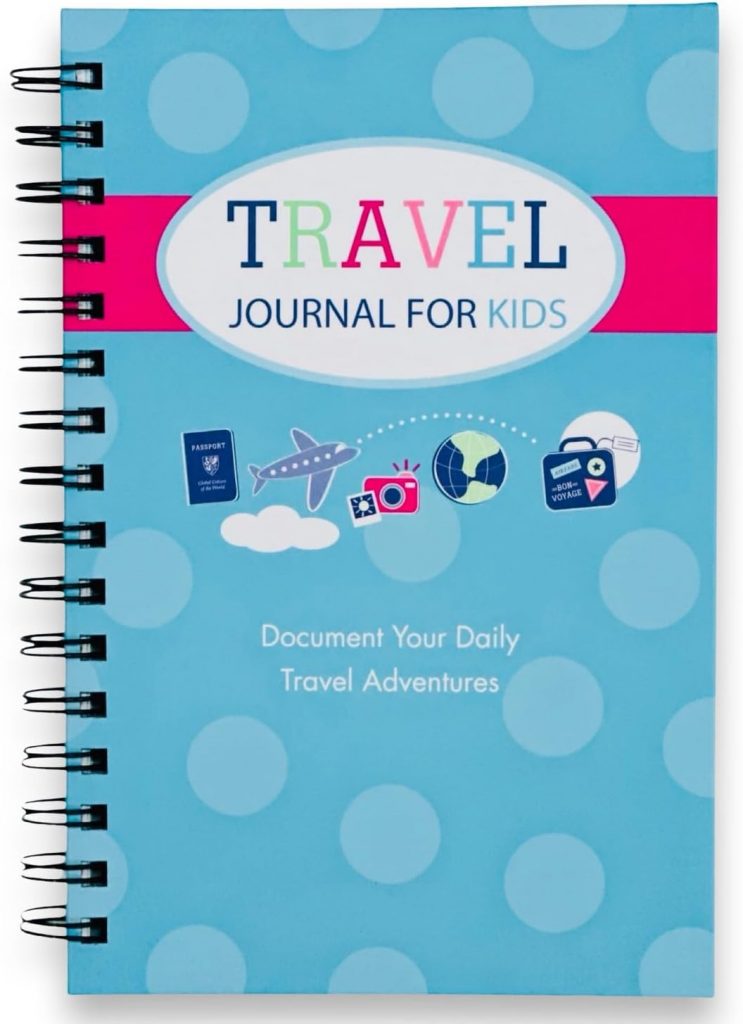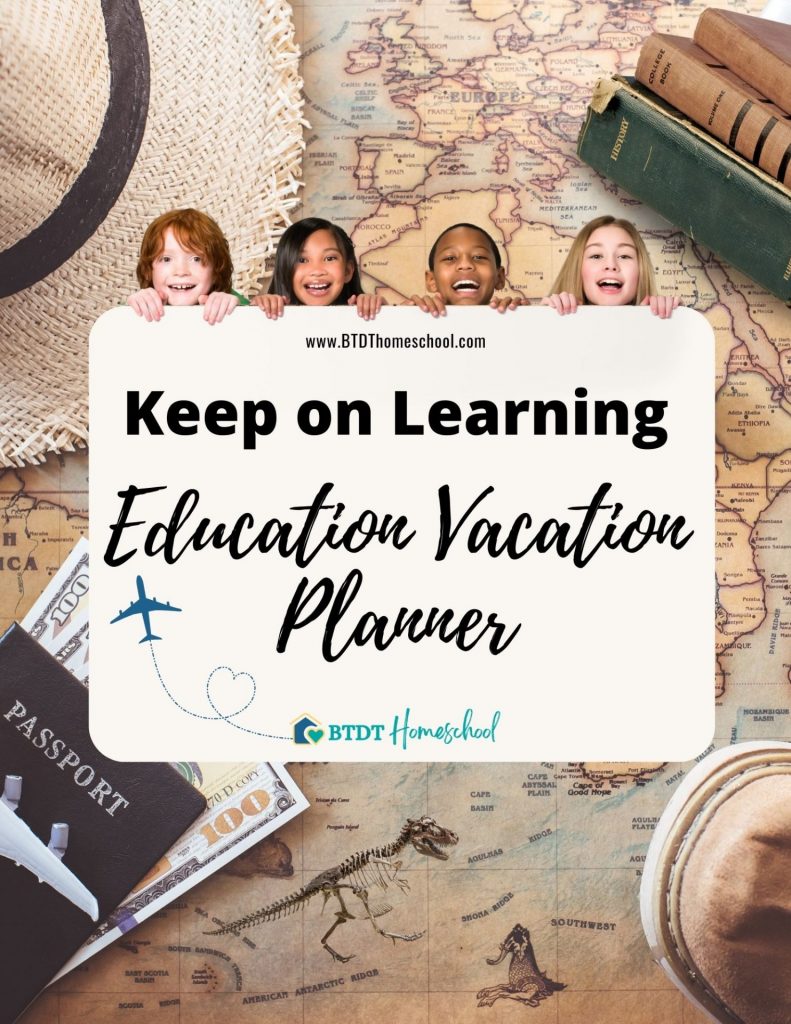Education Vacation
Keep on Learning!

Ready to turn your homeschool into an adventure? In this episode, we’re talking about how travel can open up a whole new world of learning for your family. Forget the textbooks—discover how exploring new places can create unforgettable experiences and lasting memories that make education come alive. Plus, grab our free vacation planner to help you plan your next trip! Join us and see how easy it is to make learning an exciting part of every journey.
Episode 052:
TWO WAYS TO LISTEN TO THIS EPISODE:
1. Click PLAY Button Above ^^ to listen here.
2. OR Listen on your favorite podcast platform:
Subscribe on Your Favorite Podcast Platform:
Scroll down for this week’s FREEBIE:
Education Vacation Planner (pdf)
Are you just starting your homeschooling journey? We’re here to help! Begin with our Get Started in Homeschooling page and Homeschooling FAQ to make the transition smoother. If you’re guiding a young child, explore our How to Homeschool Kindergarten. to make those first steps special. For middle schoolers, don’t miss our Middle School page packed with tips and advice. And if you’re heading into the high school years, our Essential Steps to Homeschool High School will guide you every step of the way!
Show Notes
Travel offers so many great opportunities for homeschoolers to expand their horizons beyond textbooks and traditional classrooms. By venturing out into the world, homeschool families can bring their lessons to life through immersive experiences. Whether it’s touring landmarks and historical sites, experiencing different cultures & cuisine, or exploring the natural world, educational travel ignites a sense of curiosity and wonder in students of all ages.
Homeschoolers can customize their itineraries to align with their educational goals, fostering a deeper understanding of subjects like history, science, and geography. Additionally, these journeys provide real-world lessons in independence, problem-solving, and adaptability, helping homeschoolers develop essential life skills. In this episode, we are going to talk about how educational travel empowers homeschoolers to learn through direct experiences and create lasting memories that will enrich their education in profound ways.
One of the reasons that we made the choice to homeschool was so that we had more flexibility to our schedules and could fit more travel in. A lot of people feel that being tied to a traditional school schedule feels really restrictive. We’ve always loved to just pick up and go whenever we wanted. And it’s great to be able to travel to those busier tourist places when it’s the off season.
There are so many opportunities to be had for an educational vacation that fit any budget. All it takes is a little planning and organization and today we’re going to tell you just how to do that! Learn about World Schooling.
How do I begin to plan an educational vacation? (5:59)
Designing the ideal educational road trip or vacation is an opportunity to learn about new places, cultures, history, and science in a fun and interactive way. We’re going to lay out a step-by-step guide to help you plan an educational road trip or vacation.
Determine Your Educational Goals
- What are your specific educational objectives and goals? What subjects or topics do you want to explore? Is it history, science, art, culture, or nature? Have you been studying caves and now it’s time to experience them in person and go spelunking? Think about what you want your kids to learn or experience.
- Consider the age and interests of everyone going. Tailor the trip to engage everyone. Even us moms get to have fun!
Don’t feel like you have to wait on this kind of thing until your baby is older. It’s easy to come up with a reason to put a trip off at every stage. A toddler may not remember going on a cruise, but they will always remember being part of a family that always did fun things together.
Choose a Destination
- Select a destination or route that aligns with your educational goals. Research places that offer opportunities for hands-on learning and exploration.
- Consider both well-known attractions and hidden gems that may be less crowded but equally informative and fun. Sometimes those off the beaten track places are the best experiences and memories.
- Consider eco-friendly tourism- visiting the not-so-busy areas or take the non-commercial tours and sightseeing options.
Plan Your Itinerary and budget
- Create a detailed itinerary that includes the places you’ll visit, their hours of operation, and any special events or exhibits.
- Allocate sufficient time at each location to explore and learn without feeling rushed.
- Include downtime for relaxation and spontaneous discoveries.
- Include the kids in this process.
- It’s really important to figure out a budget for all the things you will want to do on your trip- room and board, entry tickets for adventures, souvenirs, etc.
Choose your housing wisely
- This is often the most expensive part of your trip so consider your options. Do you want to stay in an RV, an Airbnb, a hotel or hostel? Or maybe even a tent?
- Do you want something cheaper outside of town, or something in town and very walkable? This could mean that you don’t have to rent a car or pay a lot for shuttles.
- Do you need a kitchen? We try to eat out and experience local cuisine, but not every meal because it can really add up.
Sometimes all you really need is just a place to stash your belongings. Find luggage storage.
Educational Materials
- Prepare educational materials such as guidebooks, maps, and relevant worksheets or activities.
- Consider using educational apps or audiobooks for interactive learning while on the road.
- Podcasts, too.
Study in Advance
- Encourage your family to study in advance. Read books, watch documentaries, or engage in online courses related to the destination or topics of interest.
- Create a list of questions or research topics to investigate during the trip.
- Save on top cultural experiences – shows, museums, galleries, workshops etc with Viator.

Explore Nature
- Incorporate outdoor activities like hiking, wildlife observation, or visits to national parks. Nature provides numerous opportunities for learning about biology, geology, and ecology.
Visit Museums and Educational Sites
- Museums, science centers, historical sites, and cultural institutions can offer valuable educational experiences.
- Look for hands-on exhibits, interactive displays, and guided tours.
- We also often like to purchase some of our guidebooks or other supplemental materials in places where that money is going back to the site.
Cultural Immersion
- Experience the local culture. We love to experience traditional foods and interact with locals. You may even attend a cultural festival. Learning about different cultures fosters global awareness and appreciation.
- Find local guides, especially when visiting a place that is foreign to you, that may place emphasis on respecting the cultures and traditions of your destination.
Learn more in Around the World in Your Homeschool

Document the Journey
- Encourage everyone to keep travel journals, sketchbooks, or even blogs to document their experiences and reflections.
- Take photos and videos to create a visual record of the trip. I like to take an actual camera especially when we’re out experiencing these, so I’m not distracted with my smartphone which stays in my bag.
- Don’t forget to bring educational tools like binoculars, magnifying glasses, field guides, or a telescope for stargazing, depending on your interests.
- After the trip, engage in follow-up activities like creating presentations, reports, or art projects to reinforce what was learned.
Flexibility and Spontaneity
Allow room for flexibility and spontaneity. Sometimes, the most valuable learning experiences come from unexpected discoveries.
Safety First
Prioritize safety by following travel advisories and taking necessary precautions, especially when traveling with children. During covid this was absolutely necessary for a while- we still always check travel restrictions.
Enjoy the Journey
Finally, remember that the journey itself is an educational experience. Embrace the opportunity to learn and bond as a family or group.
An educational road trip or vacation can be a memorable and enriching adventure that inspires a lifelong love for learning and exploration.
What kinds of activities should we include on an educational vacation? (17:03)
An educational vacation provides a unique opportunity to learn while you travel. There are so many activities you can partake in to make the most of your educational journey:
- Join guided tours of historical sites, museums, and cultural landmarks. Knowledgeable guides can offer in-depth information and context, enhancing your understanding of the place you’re visiting.
- Many museums and cultural institutions offer hands-on workshops and interactive exhibits. Participating in these activities can help you gain practical skills and a deeper appreciation for the subject matter.
- Immerse yourself in the local culture. This can include attending traditional ceremonies, trying local cuisine, and interacting with local residents to learn about their way of life.
- If your educational vacation takes you to a natural setting, consider activities such as hiking, birdwatching, or guided nature tours. These experiences can teach you about the local environment and ecosystems. If your destination is in a natural setting, consider activities like geology lessons, stargazing, or even survival skills training.
- If you’re visiting a place with a different language, consider taking language classes or engaging in language exchange programs to improve your communication skills.
- Attend historical reenactments, if available. These events can transport you back in time and provide a more vivid understanding of historical events.
- Check local event listings for lectures or talks on topics of interest. Universities, cultural centers, and libraries often host educational events open to the public.
- Attend local theater productions or live shows.
- Explore local libraries and archives to delve deeper into the history, culture, or specific topics related to your destination. Presidential libraries are a really cool place to visit, too.
- Take a cooking class to learn about the local cuisine and how to prepare traditional dishes. This is an excellent way to explore culture through food. A lot of cities offer food tourism, too. You can do a progressive dinner through several restaurants.
- Seek out specialized educational centers and institutions related to your interests, such as botanical gardens, science centers, and historical archives. If you have a membership to a museum with a reciprocal program, you can save on visits!
Learn more about getting out in communities in our Field Trip Page and download your FREE Field Trip Bundle.
Travel Journal
This Travel Journal for Kids keeps kids working on their creative writing skills during your education vacation in a fun and easy way. The daily adventure questions provide structure and routine and kids look forward to their daily ritual. Kids will begin to observe and appreciate the details of their travels, helping them become curious explorers.

American Horticultural Society Reciprocal Program and ASTC
Explore on your own with pre-researched materials or audio guides. Self-guided tours can be flexible and tailored to your interests. I also love doing walking tours on our own when we first arrive. GPS My City
The key to a successful educational vacation is to strike a balance between structured learning experiences and free time to explore and absorb the culture. It’s important to tailor your activities to your specific interests and the destination’s unique opportunities.
What are some of the best places to visit in the US for an educational vacation? (23:15)
The United States offers a wealth of educational vacation destinations, catering to a wide range of interests. We did a search online and these came up as five of the best places to visit for an educational vacation in the U.S.:
Washington, D.C.
The nation’s capital is a hub for history, politics, and culture. Visit the Smithsonian museums, explore the National Mall with its monuments and memorials, tour the U.S. Capitol, and learn about the American government at institutions like the Library of Congress and the National Archives. Do a Scavenger Hunt Adventure in Washington D.C.
Boston, Massachusetts
With its rich colonial history and prestigious universities, Boston is a great destination for history buffs and scholars. Walk the Freedom Trail to explore key historical sites, visit the Boston Tea Party Ships and Museum, and learn about American literature and culture at places like the Museum of Fine Arts and Harvard University. Boston History for Kids.
Williamsburg, Virginia
Colonial Williamsburg is a living history museum where visitors can step back in time to experience life in the 18th century. You can witness historical reenactments, interact with costumed interpreters, and gain a deep understanding of American colonial history. Colonial Williamsburg: The Guide: The Official Companion to the Historic Area.
San Francisco, California
Explore the history of the Gold Rush, the tech industry, and social movements in this vibrant city. Visit Alcatraz Island, the cable cars, the Golden Gate Bridge, and the many museums and cultural institutions, including the Exploratorium and the California Academy of Sciences. San Francisco: Fun Facts and Amazing Discoveries for Kids
Chicago, Illinois
Chicago is known for its diverse cultural institutions and architecture. The Field Museum, the Museum of Science and Industry, and the Art Institute of Chicago are just a few of the educational gems in the city. Additionally, Chicago’s architectural history is showcased through guided tours and river cruises. Chicago: Coloring The Windy City: Coloring Book: Illinois’ Largest City, Landmarks and Urban Life, Great for Kids, Teens and Adults
These destinations offer a diverse range of educational experiences, from history and science to culture and politics, making them excellent choices for an educational vacation in the United States.
Remember that the best place for an educational vacation depends on your personal interests and the subjects you want to explore. Whether you’re interested in history, science, culture, or a combination of these, there are numerous destinations around the world that can offer enriching educational experiences.
This Week’s Freebie:






